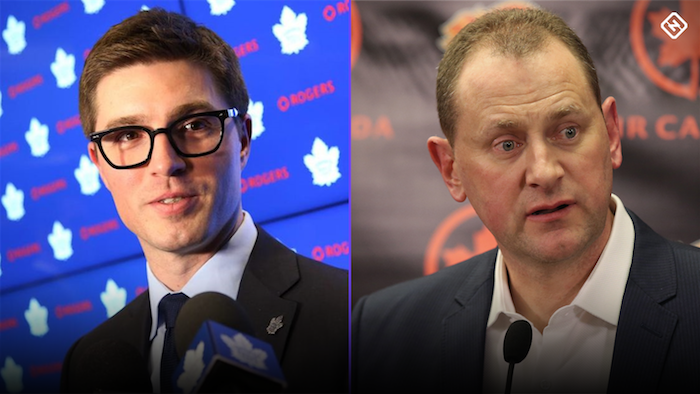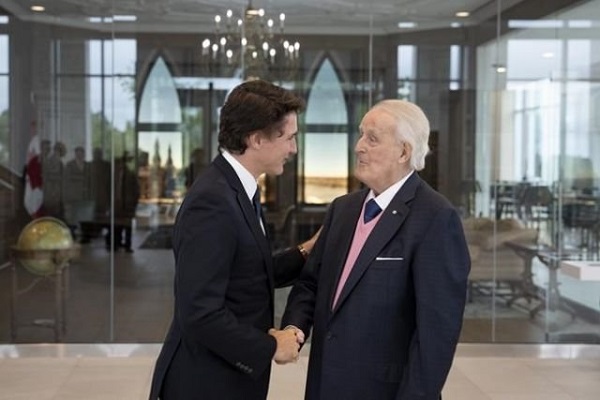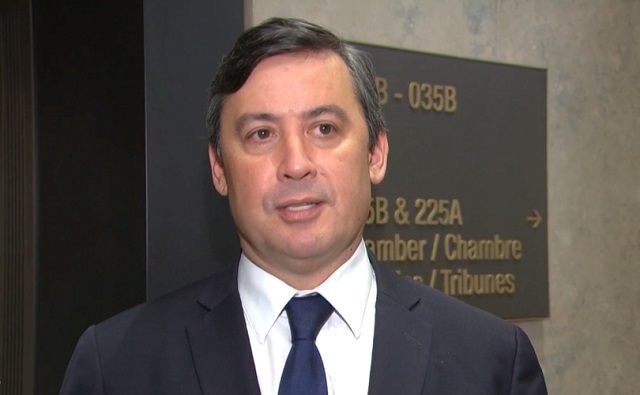Bruce Dowbiggin
Your Trash, My Treasure: Playing The GM Shuffle

“One man’s treasure is another man’s trash/ One man’s landing is another man’s crash”—Guy Clark
At the end of a season that saw his Calgary Flames fall from Pacific Division champions in 2022 to out of the playoffs in 2023, general manager Brad Treliving went to ownership of the club. Tired of seeing each Darryl Sutter ignore the products of Calgary’s development system in favour of aging veterans, Treliving wanted a fundamental change of direction for 2023-24. Get younger.
The problem for Treliving is that he had no contract past 2023 while Sutter had two years left at $4M per year on the extension Flames ownership had given him for the 2021-22 performance fuelled by Matthew Tkachuk and Johnny Gaudreau. For the parsimonious Flames the answer was obvious about the coach who’d once led the teams to the Stanley Cup Final in 2004. Sutter and his contract won out.

While the choice of retaining Sutter might have satisfied ownership, it was a non-starter for Treliving, a number of core players on the roster and the fan base— who were bitterly watching Tkachuk lead Florida to the 2023 Final. Treliving was gone from the team he’d run for nine seasons and five playoff appearances. With the implicit defection of some key players, ownership then had president Don Maloney fire Sutter.
Was Treliving the best GM in the league? Maybe not, but his work in turning the departure of Tkachuk into real assets (ones Sutter seemed to waste) was indicative of skill. In the end the Flames had made a choice that cost them both their options. Now they’re left with former hero Craig Conroy making his maiden appearance as an NHL GM. And possibly their AHL coach being promoted. Did we say the Flames are cheap?
Meanwhile in Toronto, wunderkind GM Kyle Dubas had gone from youngest genius in the NHL to shopworn object of scorn to Toronto’s roiling fan base. After seeing his heralded teams win just one playoff series (2023) since 2017, Dubas became the scapegoat for frustrations that go back to 1967. Loaded with costly, flashy stars such as Auston Matthews, William Nylander and Mitch Marner, Toronto seemed to have peaked.
So after some aborted contract talks, Maple Leafs ownership and president Brendan Shanahan said buh-bye Dubas. A hiring committee went in search of a new GM to handle the thorny contract issues Toronto faces under the current CBA. (Namely, would Matthews sign an extension this summer or would he do a Gaudreau and bet on himself in a contract year.)
Meanwhile, the 40-year-old Dubas said he was going to take some time off to consider his options. As holidays go it was a short one. No sooner had the Leafs decided that Calgary’s trash was their treasure, inking Treliving as their new GM, Dubas’ rumination ended with his being named as GM in Pittsburgh on a seven-year deal. What? Next thing you’re going to tell us is that Mike Babcock is coming back after his paid holiday from the Leafs (where Dubas and Shanahan had fired him).

You guessed it. The two-time Stanley Cup winning coach— the winningest coach in Red Wings history— once thought too mean by all the young dudes in the T-Dot was named head coach in Columbus, where he’ll try to motivate Gaudreau— who once found Sutter too abrasive. Go figure.
Fans hoping that new GMs and coaches making bold moves will bring sunny days in 2023-24 will be sorely disappointed as the crunch from Gary Bettman’s vaunted Escrow System will mean a meagre $1M bump in the salary cap for next season. Because of money lost by owners during the Covid Bubble seasons, players are working off an estimated $1.1B debt they owe owners under the terms of the glorious salary-cap capitulation by shutting down the 2004-05 season.
Of course, part of that loss in revenues can be attributed to Bettman’s Folly, aka the Arizona Coyotes, who’ve been a drag on the NHL’s revenue streams even as other clubs make out like bandits. (See: small-market Ottawa Senators estimated to be going for a billion dollars.) In addition there is probably as much as $70M in “dead” money from ill-fated contracts stuck in the works. BTW, not one player in the socialist republic of Bettman made a max salary in 2022-23 under this scheme accepted by players who cratered in 2004 and fired Bob Goodenow.

With an estimated $6M bump in the cap on July 1, 2024, there will be a lot of kicking the can down the road this summer should Treliving and the Leafs pony up the max salary to keep Matthews. They might also be able to tread water on a few other costly contracts if they trade Matthews south to a U.S. destination.
As we’ve written lately , trying to keep American stars in cold Canadian cities where they’re in a fish bowl 24/7 is becoming an issue. Many will look at Tkachuk appearing as a guest on the NBA Playoffs broadcast as indicative of what can happen if they move to a tax-free state like Texas, Tennessee, Nevada, Florida and yes, Arizona.
So the GM faces may be new in Calgary, Toronto and Pittsburgh, but the problems are same old/ same old in Gary Bettman Land. Cap gymnastics, TV cord-cutting, market disparities and the collapse off international play, among many. Expect a replay of the GM shuffle this time next year.
Sign up today for Not The Public Broadcaster newsletters. Hot takes/ cool slants on sports and current affairs. Have the latest columns delivered to your mail box. Tell your friends to join, too. Always provocative, always independent. https://share.hsforms.com/16edbhhC3TTKg6jAaRyP7rActsj5
Bruce Dowbiggin @dowbboy is the editor of Not The Public Broadcaster A two-time winner of the Gemini Award as Canada’s top television sports broadcaster, he’s a regular contributor to Sirius XM Canada Talks Ch. 167. Inexact Science: The Six Most Compelling Draft Years In NHL History, his new book with his son Evan, was voted the seventh-best professional hockey book of all time by bookauthority.org . His 2004 book Money Players was voted sixth best on the same list, and is available via http://brucedowbigginbooks.ca/book-personalaccount.aspx
Bruce Dowbiggin
Why Are Canadian Mayors So Far Left And Out Of Touch?

‘The City of Edmonton pays for a 22-person climate team but doesn’t know who on that team is responsible for what, or what that team has accomplished. Meanwhile, Council takes a pay raise and bumps our property taxes by 8.6%” @michaelistuart
We just returned from a long trip to discover that the City of Calgary wants to potentially re-zone our neighbourhood. Bridle Estates is a collection of 175 bungalow villas for people aged 55-plus. While some people still work most of the inhabitants are retirees. The city’s earnest idea is to create low-cost housing for the tens of thousands arriving here in the city from away.
You can see why a city hall obsessed with white privilege wants to democratize our neck of the south-west corner of the city. Enforced justice has a great tradition. 1970s American cities decided that bussing was the antidote to segregation. After a SCOTUS decision allowing the practice in 1971 (back when liberals owned the court) progressives pushed through an aggressive plan to bus kids from the inner city to the leafy suburbs. And vice versa.
It worked like a charm. For conservatives, that is. It radicalized a generation of voters who soon installed Ronald Reagan as president, and empty buses went back to the depot. The Democrats went from the party of the people to the party people in Hollywood. With time dulling memories, contemporary Woke folk are reviving the integration dream. This time the mostly white suburbs will bear the brunt of the government’s immigration fixation (400K-plus in the third quarter).

There are meetings planned where citizens will be able to address their elected officials— no doubt in a respectful voice. But anyone who’s dealt with Climate Crisis Barbie— Mayor Jyoti Gondek— has much optimism. This is a mayor who exploited a three-way split in centre-right voting here to declare a Climate Emergency on her first day in office.
Then she rolled out hate-speech laws to protect her from being razzed in public. For this and other fabulist blunders— her messing with the new arena project drove a worse deal and a two-year delay in a home for the Calgary Flames— she faced a recall project (which failed to collect over 400K voters’ signatures).
With a housing bubble expanding everyday, Her Tone Deafness has decided that owning a home is so passé. ”We are starting to see a segment of the population reject this idea of owning a home and they are moving towards rental, because it gives them more freedom.” She added that people have become “much more liberated around what housing looks like and what the tenure of housing looks like.”
As the Calgary’s schmozzles and Edmonton’s dabble in climate extravagance illustrate the municipal level of government in Canada is a few lobsters shy of a clambake. Across the country major cities are in the hands of radical NDP soldiers or virtue warriors who would rather have symbols than sewers to talk about.
In Toronto, Jack Layton’s widow Olivia Chow is leveraging her 37 percent mandate to make Toronto a kinder, Wok-er city. In Vancouver and Victoria, B.C., the open-air drug agendas of new mayors and city councils have sent capital fleeing elsewhere. Despite crime and construction chaos, Montreal mayor Valerie Plante won a second term, by emphasizing her gender.

In times when the coffers were full, this ESG theatre might have been a simple inconvenience. But since the federal and provincial governments began shoving responsibilities and costs downward to municipalities there is no wiggle room for grandstanding politicians at the city level. Or for hapless amateurs.
With the public incensed over residential property tax increases on one side and the blandishments of aggressive developers on the other, competent governance has never been more needed in the urban areas. While feds can (and have) printed money to escape their headaches and the provinces can offload costs onto the cities, the municipalities have no room for risk.
The time bomb in this equation is the debt load that the three levels can sustain. After this week’s budget, federal spending is up $238B, or 80 percent since 2015. Coming off this free-spending budget the feds have pushed the federal debt to more than $1.2 trillion this year (in 2015, the debt was $616 billion.) None of the provinces has shown any appetite for the 1990s-style cuts to reduce their indebtedness. Leaving cities to crank the property-tax handle again.
So far, Canada’s cities have been able to use friendly municipal bonds to ease their fiscal problems. But if the Canadian economy continues its tepid performance with no reduction in debt, financial experts tell us that there could be a flight from Canadian municipal bonds— with a consequent spike in interest rates elsewhere.
The backlash on free-spending governments will be severe— and restricted municipalities will be hardest hit. None of this is resonating with Canadians still flush with cash from Covid. The stock markets are still buoyant and those living in cashbox houses are counting their dividends. Willful denial is the Trudeau legacy.

Which is why so many Canadian were shocked last week when American AntiTrump media star Bill Maher did an intervention on Canadian conceits. Using the True North as his warning to America, Maher ripped apart the gauzy leftist dream of Canada as the perfect society, the Sweden north of Estevan. By the time he was done, the single-payer myth was bleeding on the ground.
Maher knows that the bill is coming due for free-spending Canada and its climate charlatans. (The IMF is already warning of a global crisis over debt loads.) The question is: will Canadians come to the same conclusion before it’s too late to save the cities?
Bruce Dowbiggin @dowbboy is the editor of Not The Public Broadcaster A two-time winner of the Gemini Award as Canada’s top television sports broadcaster, he’s a regular contributor to Sirius XM Canada Talks Ch. 167. His new book Deal With It: The Trades That Stunned The NHL And Changed hockey is now available on Amazon. Inexact Science: The Six Most Compelling Draft Years In NHL History, his previous book with his son Evan, was voted the seventh-best professional hockey book of all time by bookauthority.org . His 2004 book Money Players was voted sixth best on the same list, and is available via brucedowbigginbooks.ca.
Bruce Dowbiggin
Sorry, Justin. Social Media Won’t Give You A Mulroney Epitaph

The polls suck. His party is restless watching his constant gaffes. His NDP allies are similarly hoping he quits before he brings down their party, too. The public now laughs at his Happy Ways demeanour and lush living on the public dime.
It seems inevitable that Justin Trudeau is at the end of his runway as prime minister of Canada. If the polls are right, he could experience one of the greatest electoral repudiations when the federal election finally happens. Just as he replaced the dour technician Stephen Harper, Trudeau will be dismissed by the public, seen as yesterday’s man.
In desperation Trudeau has tried labelling his nemesis Pierre Poilievre as a Trump wannabe, a divisive alt-right force who would reverse the generous graft he’d bestowed on Canadians. His paid media have picked up the theme calling Poilievre’s strategy “shameful”, “cynical” and his “scorched-earth approach” is “contributing to a breakdown in overall faith in the system”. You go with that.
What makes them mad are Poilievre’s insouciant takedowns of Liberal hacks and media flacks, best epitomized by the apple-eating destruction of a lazy B.C. journalist out for a cheap score to raise his profile. A host of self-appointed press figures lost their minds. “You are not supposed to treat interviewers this way!” Since that moment, Poilievre has repeated the formula on cabinet ministers and played-out press figures.

Leaving Liberals and their wind therapists in the press to wonder what will be Skippy’s legacy in ten or fifteen years if he can’t control the messaging? Most look at the recent funeral for Brian Mulroney and the forgiving attitude from his former enemies toward Mulroney. Indeed, those who watched Wayne Gretzky and others eulogize the 18th PM of Canada as a statesman assume that this charity will eventually be extended to Trudeau.
Sure, Justin told the UN his citizens are genocidal, installed felons to cabinet posts, applauded Nazis in Parliament and showered his pals with graft. But wasn’t Mulroney also found counting bribe money from paper bags in a hotel room? Surely the charity shown to Mulroney will also be extended to Trudeau in the fullness of time?
It would be if the media/ government apparatus that existed in the Mulroney 1980s were the ones writing the epitaphs. “Let bygones be bygones”. But this fantasy scenario misses the collapse in authority suffered by that media/ government apparatus the past decade. A collapse Poilievre has duly noted.

While they rail against Poilievre’s dismissive attitude toward them, the Conservative leader understands the new dynamic where voters— especially the young— get their information from social media, not the scrum theatre of the past, engineered by politicians and the people who followed them. If Poilievre appears dismissive of their game it’s because he knows they’re irrelevant to him.
This outrage from the Family Compact comes from people like the self-obsessed MSNBC staff who whined like babies at the thought of a GOP voice on their shows. An attitude parroted by their Canadian cousins fed money by the ruling class. No wonder Trudeau is rushing through laws to censor the internet. X hates him, and he knows it.
After years of toeing the line, however, influential journalists are suddenly recognizing the damage done by their obsessions— and the peril in which their business finds itself. NPR Senior business editor Uri Berliner shocked many with his confession that Trump-obsessed NPR “lost its way when it started telling listeners how to think.

“Today, those who listen to NPR or read its coverage online find something different: the distilled worldview of a very small segment of the U.S. population”. A segment so deranged by Trump’s election in 2016 that it fed phoney stories about Russiagate and Hunter Biden’s son’s laptop to its audience over Trump’s term. NPR’s managing editor for news dismissed revelations over Hunter spilling the beans on Dad: “We don’t want to waste our time on stories that are not really stories, and we don’t want to waste the listeners’ and readers’ time on stories that are just pure distractions.” We know now this senior journalist helped bury a generational story.
Getting it deliberately wrong is bad enough, continued Berliner,. “What’s worse is to pretend it never happened, to move on with no mea culpas, no self-reflection. Especially when you expect high standards of transparency from public figures and institutions, but don’t practice those standards yourself. That’s what shatters trust and engenders cynicism about the media.”
As Berliner suggests, a population that understands the massive Covid deception is now dumping the news sources they long trusted. Hollywood, too, is reaping the whirlwind in cables cut from the nightly Colbert Chorus of Insanity. A worried NY Times has tried a limited mea culpa on overselling the pandemic (one of their reporters claimed in 2022 that Covid had “racist” roots), but the stain of its irresponsible censoring of any critics endures.
In Canada, no one at CBC, CTV, the Globe & Mail or the Toronto Star is even remotely close to owning up to their role in creating panic over Covid. (One prominent reporter received the Order of Canada for his support for lockdowns, vaccines). They have ceased reprinting Trudeaupian propaganda on the virus and the vaccines. But the silence on their enthusiastic support for closing of schools, the isolation of the dying and the firing of those reluctant to try untested vaccines speaks louder than any mealy-mouthed correction.
So the next time the prime minister and his media pals try to portray the earnest— sometimes plodding— messaging of Poilievre as a new Dark Age, consider the source. And then move into the future. Because it won’t be written anymore by the people who assume their infallibility.
Bruce Dowbiggin @dowbboy is the editor of Not The Public Broadcaster A two-time winner of the Gemini Award as Canada’s top television sports broadcaster, he’s a regular contributor to Sirius XM Canada Talks Ch. 167. Inexact Science: The Six Most Compelling Draft Years In NHL History, his new book with his son Evan, was voted the seventh-best professional hockey book of all time by bookauthority.org . His 2004 book Money Players was voted sixth best on the same list, and is available via brucedowbigginbooks.ca.
-

 COVID-1919 hours ago
COVID-1919 hours agoCDC Quietly Admits to Covid Policy Failures
-

 Brownstone Institute10 hours ago
Brownstone Institute10 hours agoDeborah Birx Gets Her Close-Up
-

 COVID-1923 hours ago
COVID-1923 hours agoJapanese study shows disturbing increase in cancer related deaths during the Covid pandemic
-

 Great Reset18 hours ago
Great Reset18 hours agoClimate expert warns against extreme ‘weather porn’ from alarmists pushing ‘draconian’ policies
-

 espionage3 hours ago
espionage3 hours agoConservative MP testifies that foreign agents could effectively elect Canada’s prime minister, premiers
-

 Health2 hours ago
Health2 hours agoQuadriplegic man dies via euthanasia after developing bed sores waiting at Quebec hospital
-

 Economy2 days ago
Economy2 days agoExtreme Weather and Climate Change
-

 Bruce Dowbiggin2 days ago
Bruce Dowbiggin2 days agoWhy Are Canadian Mayors So Far Left And Out Of Touch?

